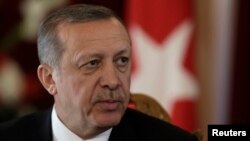Turkey's prime minister and his economic team will seek to calm nerves among top investors in New York who hold more than 20 percent of the main Istanbul stock index, after President Tayyip Erdogan's tirades against the central bank helped send the lira to record lows.
Erdogan has repeatedly attacked the bank over its failure to cut interest rates as sharply as he wants ahead of a June general election, telling its governor and Deputy Prime Minister Ali Babacan, who is in charge of the economy, to “shape up.”
His comments have fueled uncertainty about the future of both Babacan, an anchor of investor confidence, and bank governor Erdem Basci. Ministers have tried to reassure markets that neither is about to quit.
The lira dropped to its latest all-time low of 2.5705 against the dollar as Economy Minister Nihat Zeybekci, an Erdogan loyalist not among the New York delegation, renewed calls for sharper rate cuts.
The central bank has price stability as its core mandate and fears, along with most economists, that sharp interest rate cuts would stoke inflation, already running well above its 5 percent target.
Babacan, Prime Minister Ahmet Davutoglu, and Finance Minister Mehmet Simsek are due to meet Goldman Sachs, Citi, Bank of America Merrill Lynch and various portfolio investors and fund managers in New York on Wednesday and Thursday, officials in the prime minister's office said.
The investors they will meet hold an estimated 22 percent of Turkey's top-100 share index, according to Isik Okte, investment strategist at Istanbul-based TEB Invest.
“The impact on the economy of President Erdogan's statements is triggering concern. That's what we understand from the questions coming in,” one senior Turkish economy official told Reuters ahead of the meetings.
“What has happened recently in domestic politics and on the economic data front is temporary and will not cause lasting damage. We will share this view with investors.”
Sentiment towards the lira was not helped by data on Tuesday showing annual inflation rising to 7.44 percent, sharply above the bank's 5 percent target, limiting its room to cut rates as sharply as Erdogan wants.
Commenting on the data, the bank said core inflation indicators had continued to improve. Economists expect it to trim its policy rate by a further 25 basis points at its next meeting on March 17, if the lira does not tumble sharply.
Central Bank's hands tied
With the lira repeatedly hitting new lows and the dollar expected to keep strengthening, the central bank's hands appear tied. Reluctant to hike interest rates, it has also so far not significantly increased its dollar sales to the market, an option it has used in the past to defend the currency.
The lira's falls have filtered through into equities, with the main Istanbul stock index falling 2.6 percent to its lowest in 11 weeks.
TEB Invest's Okte said the outcome of the New York meetings would be “of critical importance” to the market's direction.
“One of these funds can sometimes set the market trend with single transactions worth hundreds of millions of dollars. If investors leave these talks without getting the answers they want, we can expect selling pressure,” he told Reuters.
“But one must not forget that Babacan has held hundreds of such talks with leading global funds in the last 12 years, some in even more difficult times like the Gezi Park incidents,” he said, referring to widespread anti-government demonstrations in the summer of 2013. “One must trust his experience.”
Erdogan's pressure for rate cuts is driven by flagging economic growth, which slowed to 1.7 percent year-on-year in the third quarter and is now expected to amount to around 3 percent in 2014 as a whole, below a 4 percent target.
His rhetoric is popular with a class of businessmen who have thrived on cheap loans and political stability over the past decade and have formed the bedrock of support in his successive election victories, meaning pressure on the central bank is unlikely to ease before the June vote.
“Investors will bring up the debates on rates and inflation which Erdogan has recently put on the agenda. But our approach is this: it's natural for there to be debates on interest rates, we find this normal,” a second senior Turkish official said.
“What is important in the economy is to increase supply and production and hence achieve growth. What the government wants, and the subject which Erdogan is sensitive about, is the central bank lowering interest rates so as to support exports.”
The debate on rates is not the only source of market nerves.
Ratings agency Standard & Poor's said last month's management takeover by regulators of Islamic lender Bank Asya showed the potential for political risks to spill over into the financial system.
But it said the June parliamentary election, at which Erdogan wants the ruling AK Party to secure a stronger majority to help him create a full presidential system, should not pose a particular source of risk for banks.





